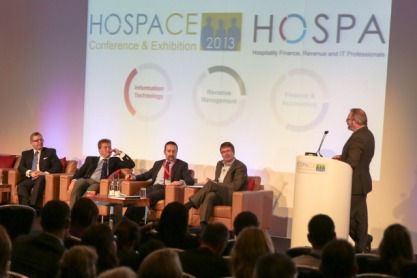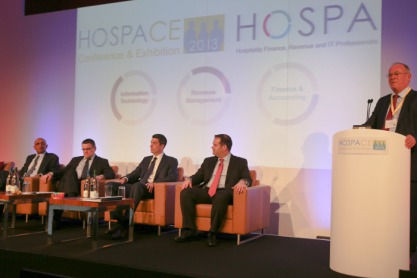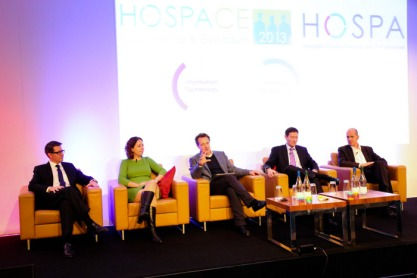HOSPACE 2013 - Lots to think and talk about
- Jane Pendlebury
- May 17, 2021
- 7 min read
Last Thursday, HOSPA hosted HOSPACE 2013, their 6th annual conference at the Sofitel Heathrow. This has been the biggest conference yet, with over 400 delegates from varying disciplines across the hospitality industry. The event was an opportunity to meet liked minded people, listen to some very interesting views from Industry experts and gain a real insight into the key issues affecting the sector. What made it even more fascinating was the breadth of differing opinions within the panels, each backed with their own personal experiences and some great stories.
So what were the main messages from the conference?
Industry Overview/Outlook
The conference opened with Industry overview by PWC and STR Global. Research shows there are clear signs of recovery and the industry is experiencing positive growth, with UK and Ireland experiencing highest occupancy levels compared to the rest of Europe (above 70%). In the UK, as expected, London has the greatest occupancy levels, followed closely by Heathrow, but what is surprising is that Nottingham had the lowest occupancy levels, even less than Liverpool. Scotland has experienced the highest year on year growth at 9.8%. This growth is evident across the board from budget to luxury hotels.
And what does the future look like? With international travel volumes increasing, all inbound to the UK, it is no surprise that UK has the highest pipeline, followed by Germany and Russia. The supply is expected to become more crowded, with 20,000 new rooms to be available in 2014, but despite this additional supply, occupancy levels are expected to remain high, with 82% forecasted for London and 71% for the Regions.
Leaders Panel

This panel featured champions from the industry discussing key issues and trends facing the sector. The panel consisted of Peter Hancock - CEO Pride of Britain Hotels; Robert Cook - CEO De Vere Hotels and Village Urban Resorts, President of HOSPA; Heiko Figge - Moorfield Group; Jonathan Raggett - MD Red Carnation Hotels and Stewart Campbell - MD Redefine BDL.
One of the topics discussed was talent within the industry and it was concluded that industry does not have an issue with talent. Hospitality has created some of the best leaders in the world and that “great brands arise from great people within”. But the panel were divided on whether this talent remains within the industry or not.
It was agreed the biggest issues facing the sector are the increasing energy prices, occupancy levels remain strong, the ever rising cost of food and there have be no pay rises for 5 years above the national minimum wage. As we emerge from the recession employees will expect significant pay rises. These factors will no doubt squeeze margins, but more capital will be available.
There were very mixed opinions amongst the panel on technology, where some believed that the sector needed to “embrace technology more, otherwise the hotels will be left behind”, thus more investment required in technology. Others, believed the investment should be in people, “looking after each and every guest, making every experience effortless”.
Online Travel agencies (OTAs) were first seen as a threat to the industry, but businesses now have to embrace them, as they are here to stay. There are also a way of generating additional income, but have a cost associated to them, a cost that was not present previously. Hoteliers tend to view websites as online brochures and do not pay enough attention to the functionality and this is where OTAs gain competitive advantage. Now with the rise of the so called metamediaries (e.g. Room 77, Hotel Tonight etc) it is becoming increasingly difficult for hotels to reach their customers directly.
So what do the experts predict for the future? More hotels being built, hotels are changing, as traveller demands are changing and a lot of business is coming from China, due to the relaxed VISA criteria. And as the economy recovers, there will be more money available to spend and invest.
Finance Panel

The Finance panel discussed “the changing face of the funding landscape” for industry. The panel featured Paul Dukes - Chairman, Kew Green Hotels & Chairman, HOSPA; Graeme Smith - Partner, Zolfo Cooper Corporate Finance; Andy Lancaster - Head of Hotels, UK Sector Coverage RBS; Paul Beaumont - Head of Deal Origination, Downing LLP and Navneet Bali - CEO and Head of Development & Finance Meininger Hotel Group.
Finance is and has always been available, any good deal is fundable. The assessment criteria has not changed, but there are new sources of finance, making funding more accessible to different types of organisations. The criteria is very much dependent on the financier and the business. In 2006 the market was dominated by High Street banks, but now the market is dominated by 40/50 different sources of finance. The breadth of the funding market has changed, “insurance companies are becoming more active and there are many newcomers”. These are a mixture of household names and high net worth individuals looking to invest and there has been an increase in investment from abroad especially Russia, India and China.
Is there investment available for independents? Or is brand key? Brand is seen as a “comfort blanket”, but investors are looking more in depth and asking questions such as what is the competitive advantage? How sustainable is the business? Who are the management team? What is the business plan? How does the business operate? Where is it located? What does the future pipeline look like? What are the distribution channels?
It is important to note that “confidence is key and confidence is improving”. Investor confidence is improving and Hotelier confidence is improving.
Technology Panel
This panel discussed whether technology is good for the industry and featured IT stalwarts, Bryan Steele - IT Committee Chairman, HOSPA; Jeremy Ward - Senior VP of IT, Kempinski; Timo Kettern - IT Director, Westbridge Europe; Andrew Jacques - IT Director, Apex Hotels; Carson Booth - VP Global Property Technology, Starwood Hotels & Resorts and Paul Squires - UK head of Wireless Portfolio, Motorola Solutions.
It was interesting to listen to the extent of the technology available to the industry and what different businesses are focussing on from getting the basics right to the pilot stage of BMW working with Westbridge on technology to enable guests to check in whilst driving from the airport to the hotel. Thus being able to go straight their hotel room, bypassing all human interaction at the hotel reception.
Kempinski have outsourced their data servers to Amazon, along with cost benefits, they have the flexibility to upgrade and downgrade servers and different times. This has proved extremely valuable at month end, when all Hotel FCs are trying to upload their accounts.
All the panellists agreed it was difficult to define the ROI on technology spend and that “technology should be seen as a tool to deliver the right information to the right person, so that the person can have the best experience”. The rise of the middle class, has meant more people have access to instantaneous information and can discover the world, “technology enables our business and it enables us to interact with our guests”. In an attempt to reduce the in-room marketing collateral and keep “up to date”, Kempinski have piloted a scheme in 2 hotels, whereby they have installed iPads in the rooms. Kempinski noticed a 40% uplift in room service sales for 1 hotel and a 15% uplift in the other.
There was much discussion around everything moving to the cloud and having zero interaction with people. But is that right for an industry that is service led? Surely, the reason why many hotels get great reviews is down to the customer service they provide?
And what about the future of technology being deployed in hotels? It is important to get the basics right, as the biggest dissatisfier is the internet provision. There was once a time when hotel technology was way ahead of guest technology, but this is not the case anymore. It is becoming more and more difficult for the industry to keep up. The industry also need to rethink about the IT involvement in a new hotel. Currently, IT get involved at 70% into the planning stage, when most decisions have been made. But it is important to get be included from the onset as IT has become a significant part of the hotel operation.
Revenue Management Panel

This panel featured an interesting mix of experts discussing a range of issues facing revenue generation. It included Lawrence Hunt - COO, Lowcosttravelgroup; Brian Hicks - VP Revenue Management, IHG; Howard Langer - Global Capability MD – Pricing and Promotions, dunnhumby; Uli Pillau - MD, hetras and Monique Jaspers-Wijn - Global Head of Partner Marketing, Travelport.
The panel opened the discussion with direct business vs. business through OTAs. For most hotels 20% of their customers’ book directly through them and the rest come from other channels (mainly OTAs). The IHG group, however have 80% direct business. This has been achieved through the power of the brand, a loyal customer base and great sales teams at the hotels. They are still very much people centric. But OTAs have access to large customer base, the industry needs them and they need the industry.
So what other areas will generate additional revenue? The views were mixed, some believed it would be “selling loyal customers additional services, which the industry is really poor at”. Some believed social media was the key, as it’s all about marketing and sharing experiences, which will give rise to new business. It is important to look at the next generation of traveller and their demands. The current traveller tends to find technology and social media intrusive, but the next generation do not share the same views. The industry is heading towards price transparency, no longer about price parity. Customers are willing to pay extra for better service/product.
The conference definitely provided a lot of food for thought and was well received by the delegates. It will be interesting to watch how the industry does advance.
Reproduced with permission from EP Business in Hospitality. For more information on all of the initiatives run by EP or to get (more) involved with the community, please contact Arlene McCaffrey.
For more information on HOSPA and HOSPACE, please contact Wayne Gosden.





Comments